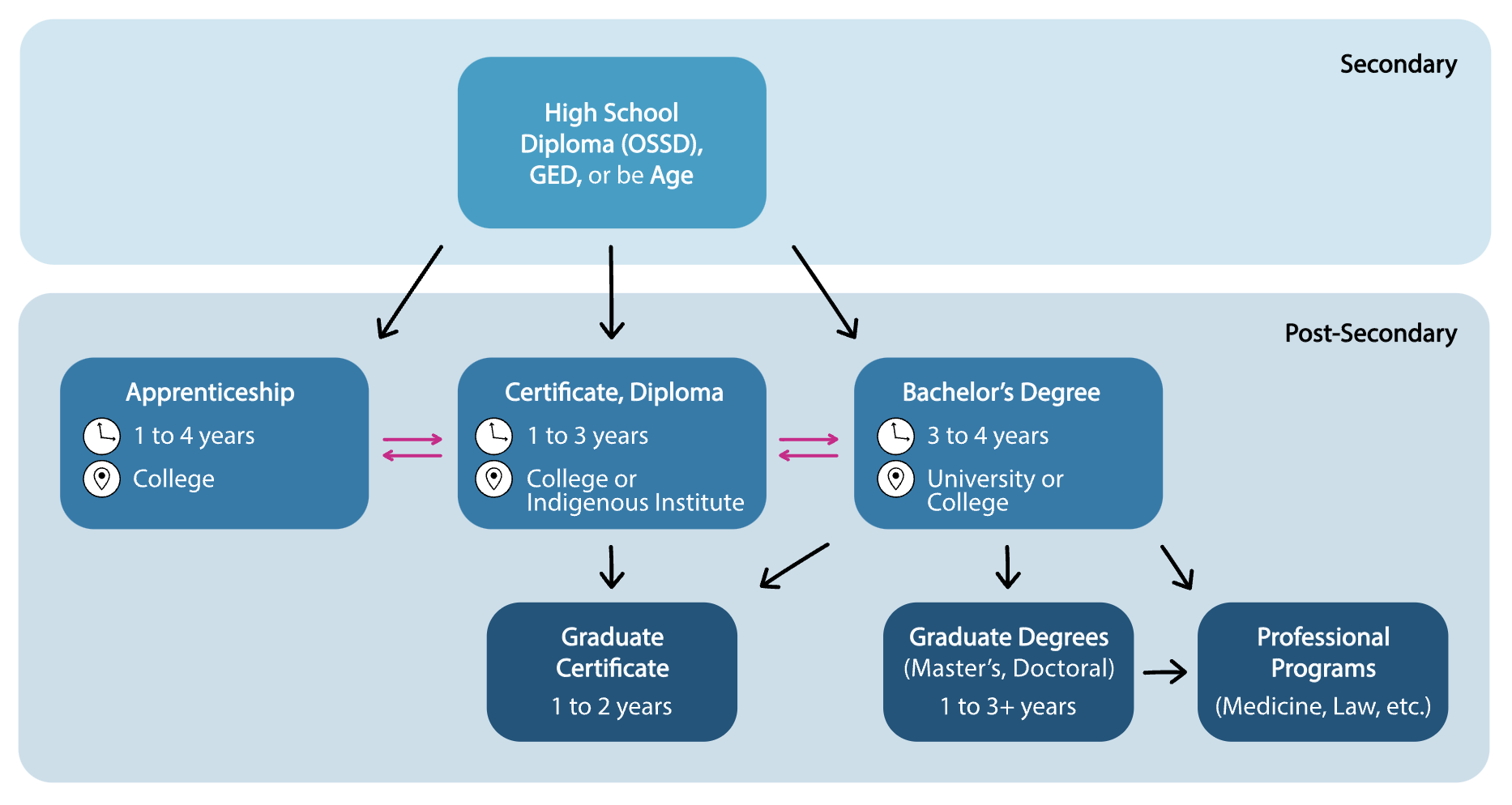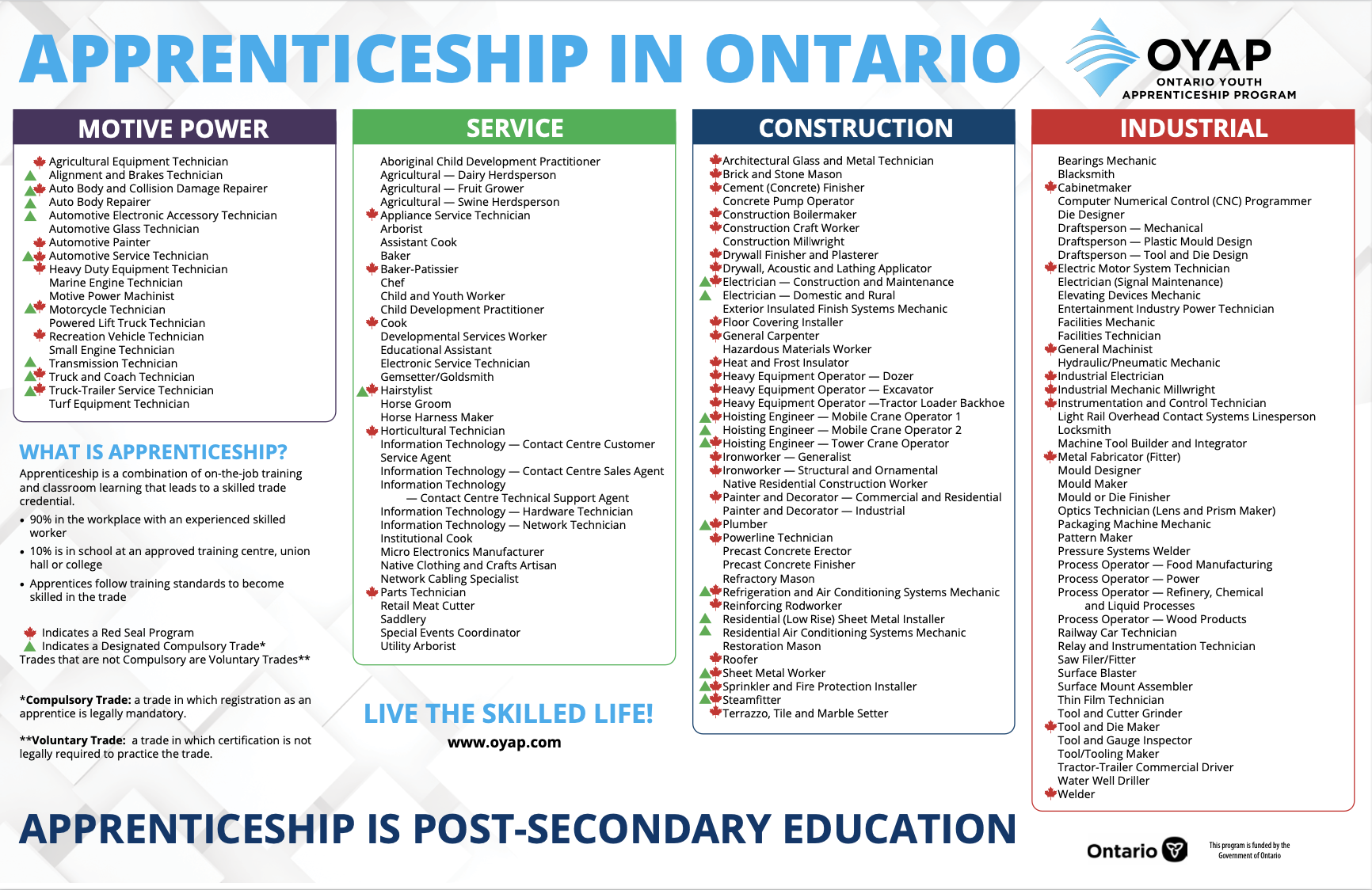A pathway planning journey will involve a transition from secondary pathways planning to deciding on a post-secondary destination. Make sure to make informed choices by:
- considering your strengths and interests and how those can be applied to career and life goals
- considering their options through recreational, social, leadership, volunteer, part-time employment and experiential learning programs
- considering their goals and identify the resources required to implement a plan to help obtain those goals
- seek help from their Guidance Counsellor
The idea of planning a pathway toward an educational goal should be focused, yet flexible. Educational goals can change over time. The ultimate goal of a student is to find and enjoy meaningful work. It's never too early to start researching options to find out more about post-secondary choices -- the best way to make the right decisions is to be informed.
Visit DCDSB Transitions and Pathways for additional information and resources.
Students are encouraged to utilize career and post-secondary websites like myBlueprint to explore education options, to visit college and/or university campuses or Open Houses, and to attend the following fairs:
- reading & writing
- numeracy
- digital literacy
- communication
- collaboration & teamwork
- problem-solving skills
- adaptability
- creativity & innovation
Keep an open mind and consider all the post-secondary options:

Apprenticeship
Apprenticeship is a post-secondary pathway that combines on-the-job training, work experience and technical training that leads to certification in over 150 trades.
- Employers provide about 90% of the apprenticeship training in the workplace.
- All apprentices attend in-school sessions offered by approved training delivery agents (e.g. colleges, unions) for the remaining 10%, which involves classroom instruction on theory.
- Once both school and on-the-job components have been satisfied, apprentices will receive a Certificate of Apprenticeship.
- For trades with exams, apprentices must pass the exam before they can receive their Certificate of Qualification.

For more information about apprenticeship opportunities, visit:
- Apprenticeship Career Connections
- ApprenticeSearch.com
- Careers In Trades
- College Trades**
- Ellis Chart
- Find Your Trade
- Government of Ontario
- Ontario Youth Apprenticeship Program
- Red Seal
- Skills Canada
- Skilled Trades Ontario
- Support Ontario Youth (SOY)
**Search trades programs at Ontario Colleges.
What the employers are saying:
- take math, science, and tech courses in grades 11 & 12
- get your drivers' licence
- get certifications (ie. CPR & First Aid, High Five, Workplace Safety, etc.)
- get involved in extra-curricular or volunteer opportunities to demonstrate that you can collaborate and work on a team
- be on time and attend school regularly to demonstrate that you are responsible
Learn more about the Construction Trades:
- Carpenter
- Chemical Technician
- Commercial Inspection & Maintenance Driver
- Construction Boilermaker
- Construction Labourer
- Electrician
- Heat & Frost Insulator
- Industrial Millwright
- Instrumentation Technician
- Ironworker
- Non-Destructive Testing Technician
- Operating Engineer
- Painter & Decorator
- Plumber
- Radiation Protection Technician
- Sheet Metal Worker
College
There are 27 colleges in Ontario, located throughout the province. Colleges offer a variety of diploma, certificate and applied degree programs. The basic admission requirement for postsecondary programs in the Ontario College system is one of the following:
- Ontario Secondary School Diploma (OSSD) or
- any lesser minimum admission requirement as established by a college on a program-specific basis.
Ontario colleges offer more than 2,400 program choices in almost 600 subject areas. Programs are career-oriented and geared toward marketable skills. Find out about programs, arrange a campus tour or talk to college staff who can answer your specific questions.
Visit Ontario Colleges for more information and college specific requirements.
Resources for Students with Disabilities:
- Durham College - Community Integration through Co-operative Education (CICE)
- Fleming College - Community Integration through Co-operative Education (CICE)
Community Living
Transition planning is about looking ahead to the future and preparing for adulthood. It is a partnership involving student, parent, teachers, friends, community and adult service providers, and any other individual with a vested interest in your child. Consideration must be given to such things as:
- Living arrangements
- Community programs
- Employment opportunities
- Further education opportunities
- Health care
- Recreation and social activities
Visit Developmental Services Ontario for information.
University
To attend university, students must attain their Ontario Secondary School Diploma and 6 of their grade 12 courses must be at the University or University/College Level. There are 21 universities in Ontario, offering professional programs in a variety of fields. Universities offer three and four year undergraduate degrees. Professional programs such as dentistry, medicine, engineering and education are offered at several Ontario universities.
For specific information about programs, visit ontariouniversitiesinfo.
Visit Tyndale University if you are interested in pursuing your studies at a Christian university in Toronto. A wide range of programs at the undergraduate, seminary and graduate levels are available.
Need to write the CASPer Test for admission to your program? Visit caspertest.com to find out more about the test, try sample tests and get tips on how to do well.
Resources for Students with Disabilities:
- Ontario Tech University - Accessibility Services
Workplace
The goal of all students is to find employment that is fulfilling and of service to society. There are many ways to get to the world of work and one of the ways is through an entry-level job. Students will find information regarding the availability of entry-level jobs in their guidance department at high school. A number of organizations exist in Durham Region that help assist students to find employment after high school. An important organization is Employment Ontario.
For more information about opportunities, visit:
Other
- Canadian Coast Guard
- Canadian Forces
- Private Career Colleges
- Ontario College/University Transfer Opportunities
Resources for Indigenous Students:
Resources for Students with Disabilities:
- Learning Disabilities Association of Durham Region
- Transition Resource Guide for Students with Disabilities
Gap Year
A gap year is time away from normal routine, to experience personal growth through volunteerism, travel and work.
Gap years can be for anyone but are especially beneficial to people who:
- do not feel ready for the next phase of life – ex. going to college, university, or into the workforce
- have started on a post-secondary path but do not feel it is a good fit and would like to explore other experiences
- are lacking direction; unsure of where life is going
- feel burnt out, apathetic or disengaged and need to step away from ‘normal’ life and experience something new
- want to develop a sense of autonomy by trying new things that might not otherwise be possible
- feel a need to gain a global perspective
For more information, visit:
